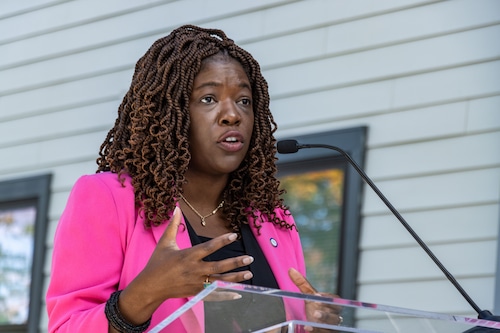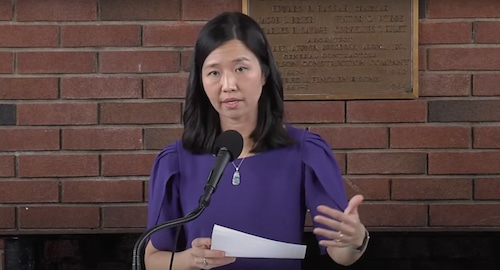As Boston pushes to raise taxes on commercial property to make up for projected falling revenues, some city councilors are advocating for the city to diversify its tax base.
Property taxes are expected to make up about 71% of the city’s revenue in the upcoming fiscal year, according to public documents filed with Mayor Michelle Wu’s proposed fiscal year 2025 budget. But that could change in the near future, as the City Council prepares to discuss how to diversify its revenue streams.
“Ten or 12 years ago, it was around 55%, and everyone was losing their minds,” said Councilor Liz Breadon, who said she had long advocated for taking a look at revenue. “This is just a totally unsustainable pathway.”
The portion of the city’s budget coming from property taxes has gone up significantly in recent history: In 2012, it was 65% of revenue compared to 2002 when it was just 52%.
Even at those lower levels, though, Boston was far from typical. In New York City, property taxes made up about 29.5% of revenue in fiscal year 2024; in Washington, D.C., it was about 21.7% and in Los Angeles, about 34.6%. According to a data dashboard released by the Government Finance Officers Association, property taxes made up just 18.32% of the aggregate revenue brought in by all cities in the United States with populations of at least 10,000 in 2017.
The difference in Boston is that unlike in other states, the state Legislature does not give municipalities the authority to introduce certain revenue streams that other major hubs rely on, such as local sales or income taxes.

City Councilor Ruthzee Louijeune speaks at a ribbon cutting for Saige on Fountain, a new affordable condo project in Roxbury, on Oct. 23, 2023. (Tréa Lavery, MassLive)
“What’s unfortunate is our limited home rule authority (and) … how difficult it is for us to get those new revenue streams,” said City Council President Ruthzee Louijeune at a recent hearing of the Committee on Government Operations. “The city of Detroit is looking at taxation for land valuation instead of buildings, which I think are things for us to look at, but the innovative things, the things that we really want take time and are really hard because of our limited home rule authority.”
- Read more: Mass. tax collections were down $260M in May
According to city budget documents, the rise in the portion of revenue from property tax has also been tied to a boom in construction activity and accounts for almost half of the net revenue increase between fiscal years 2024 and 2025.
Boston City Councilor files revenue diversification hearing order
City Councilor John Fitzgerald filed a hearing order before Wednesday’s meeting to discuss changes to Boston’s revenue breakdown, which received wide support from the council. Fitzgerald told MassLive earlier this week that he didn’t have any specific ideas of changes to make, but just wanted to get the ball rolling.
“Do we look at what permit fees are for different things that we do here in the city, and is it worth maybe raising some of those to bring in new revenue? Do you look at taxes on nonessential goods?” Fitzgerald said. “I’m certainly not looking to tax the everyday residents of the city of Boston more. It’s not like we’re like, ‘Let’s do more property tax, more excise tax,’ or anything like that, but sort of looking for different, alternative means of revenue. Even if it’s not huge, huge numbers, it’s things that might be able to soften a blow later on down the line.”
According to the Government Finance Officers Association, municipal revenue should be able to provide adequate funding for city services even through changing economic circumstances, and an over-reliance on property taxes frequently does not do so.
“The changing economy has challenged the relevance of the property tax,” researchers for the organization wrote in an October 2021 report on the need to restructure local governmental revenue. “Most fundamentally, a large part of the value created in the modern economy does not involve property — it often involves less tangible things, like financial instruments or bits and bytes.”
A February report by the Boston Policy Institute estimated that with falling property values for office buildings post-pandemic, the city could expect to see a budget shortfall of between $1.2 and $1.5 billion over the next five years.
In addition to the approximately 71% of projected revenue for the coming year from property taxes, state aid accounts for about 11%, local revenue for about 13.5% and other non-recurring revenue for less than 1%, according to budget documents. While local revenue has increased since last year, state aid has dropped by $1.1 million, mostly due to decreases in education funding.
Fees and taxes on services bring in largest portion of local revenue
The largest portion of local receipts comes from excise taxes and fees, which are expected to bring in $253.9 million. About 98% of these fees come from the city’s room, motor vehicle, jet fuel and meals taxes, but additional fees bring in some revenue from marijuana sales, vehicle rentals and condominium conversions.
Other local revenues come from license and permit fees, fines, the city’s payment in lieu of taxes program, investment interest, miscellaneous departmental revenue and other sources.
At Wednesday’s City Council meeting, some councilors brought up potential new revenue sources. Councilor Sharon Durkan said a proposal she filed earlier this year for Boston to consider merchandise licensing could be one small future source of income.

Boston Mayor Michelle Wu speaks at a press conference in Dorchester on Jan. 25, 2024. Wu has proposed a temporary tax rate increase on commercial property, which was approved by the City Council and must now be approved by the Legislature. (Screenshot)
City of Boston
Councilor Brian Worrell suggested the city look at “taking a slice of the resale market” on event tickets, adding that the cheapest seats he had seen for Celtics games during the NBA finals were around $800.
“It’s also important for us to acknowledge that we’re going to experience difficult economic times,” said Councilor Ed Flynn. “Part of that, I think, is addressing the spending that continues to take place. We do have to acknowledge that spending also is going up significantly in the city, and that’s one reason we have to be more fiscally responsible, whether it’s city, state or federal government.”
Wu’s proposal to increase commercial property tax rate must be approved by Legislature
Last week, the council passed a proposal from Mayor Michelle Wu to raise the tax rate on commercial properties, lowering the rate for residential property owners in the process, to relieve some of the cost burden on homeowners in the midst of the housing crisis. The change will have to be approved by the state Legislature to go into effect.
Opponents of the tax proposal said it would place additional challenges on commercial property owners at the same time that their property values are decreasing.
Fitzgerald, one of four councilors who voted against the proposal, said Monday that this reasoning was also part of why he wanted to discuss revenue diversification, so the city did not have to resort to charging property owners more when it projects lower revenues.
“You either have to sort of raise it on one side or the other to make it balanced. And there are times, obviously, where that would hurt residential, and there are times when it hurts the commercial more,” he said. “This is a way to help make things more fair, so we’re not kicking commercial while they’re down, or pricing out residents who are born and raised, or even just moved here … making it too expensive to them to even reside in the city.”
The Committee on Ways and Means will hold a hearing on revenue diversification at a later date.
City CFO Ashley Groffenberger’s office did not comment on the idea of diversifying revenue streams but said in a statement to MassLive that they “look forward to the conversation at the hearing” when it takes place.






